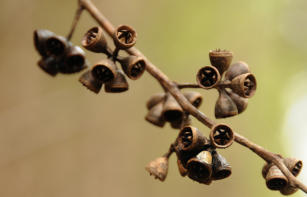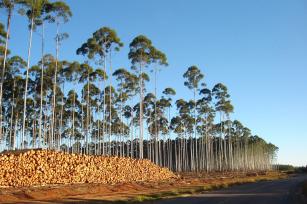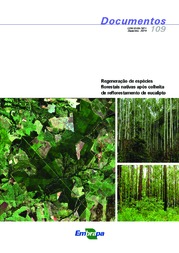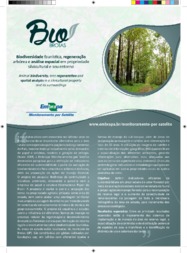BioBrotas - Faunal Biodiversity, Arboreal Regeneration and Spatial Analysis in Silvocultural Estates and their Surroundings
BioBrotas - Faunal Biodiversity, Arboreal Regeneration and Spatial Analysis in Silvocultural Estates and their Surroundings

Photo: Torresan, Fabio
Eucalyptus cropping has been growing in Brazil in the last few years and has become an important alternative for rural areas. With expressive participation in the country's trade balance, it is moved by the demand for paper, cellulose, timber and evergy. Since 2009, Embrapa Satellite Monitoring has carried out research to define efficient sustainability indicators from the assessment of tree and bush flora biodiversity and faunal biodiversity, in addition to proposing forest management actions. The BioBrotas project gives continuity to previous initiatives and studies the influence of different types of management in the process that induces regeneration and in the development of native forest species to establish legal nature reserves and increase connectivity among remnants of the landscape in the entire microbasin under study. The project proposes to evaluate land use and occupation in the agricultural estate under study, as well as to adopt a wider territorial approach for the landscape surrounding the property by using remote sensing tools and geoprocessing techniques. The study areas are located in Brotas, São Paulo. The areas comprise plots cultivated with Eucalyptus spp., in sections divided by different ages and understory management, in addition to permanent preservation areas and plots that have not had any intervention in over 20 years. The use of images obtained through satellite and geographic information systems (GIS) will enable the spatialization of the different types of environment, generating information for more adequate land use alternatives from an environmental point of view.
Ecosystem: Cerrados Region
Status: Completed Start date: Mon Jul 01 00:00:00 GMT-03:00 2013 Conclusion date: Tue Jun 30 00:00:00 GMT-03:00 2015
Head Unit: Embrapa Territorial
Project leader: Carlos Cesar Ronquim
Contact: carlos.ronquim@embrapa.br
Keywords: Eucalipto, Cerrado, Sustentabilidade, Uso e ocupação das terras



